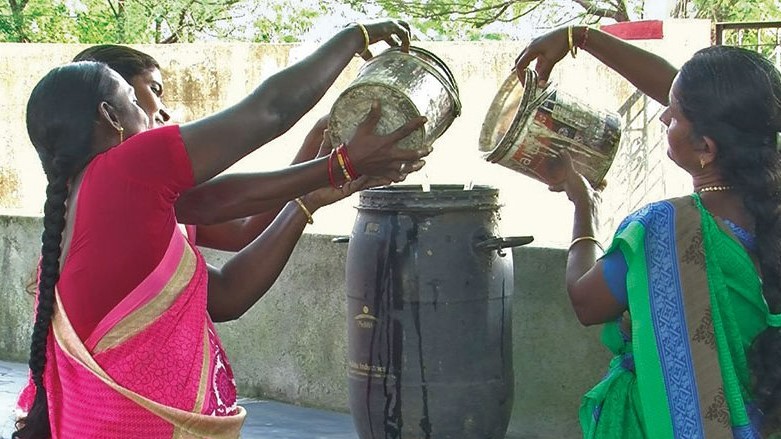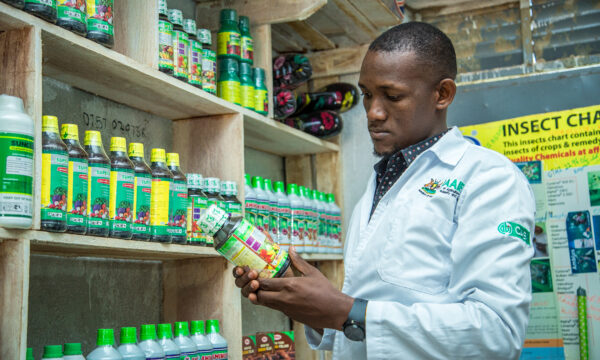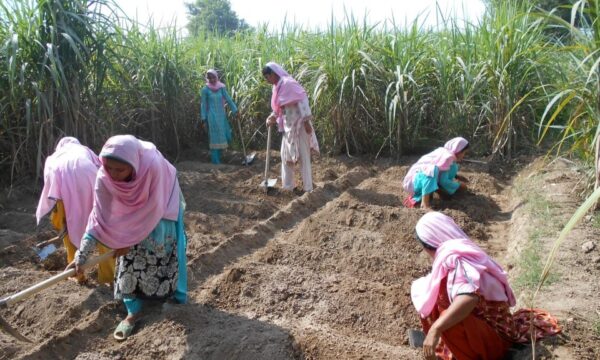
In 2003, twelve women in Chokkalingam Puddur village started a local biocontrol agent production unit. The Ellya Thendral women self-help group produced and marketed five different types of fungal biopesticides. Their cottage industry received a boost when a Plantwise plant clinic was established in their village.
CABI’s Plantwise programme partnered with M S Swaminathan Research Foundation (MSSRF) to establish 60 plant clinics in India in 2013. In Chokkalingam Puddur village, the plant clinic served between 25-30 farmers each month.
With techincal advice and support from the plant clinic, the women set out to provide biocontrol products to local farmers. This helped the women of the group increase their own financial stability, knowledge of biocontrol agents, and their social capital. In the wider community sense, the group facilitated better access to biocontrol agents through local agro-dealerships.
A team including CABI’s Malvika Chaudhary, Mariam Kadzamira, and Frances Williams, plus Ramasami Rajkumar from MSSRF carried out a study to analyse the full impact of Plantwise plant clinics established in Chokkalingam Puddur village in linking their advice of using biofungicides to product availability through Ellya Thendralwomen’s self-help group.
The results of which are documented in a new article in Rural 21 – The International Journal for Rural Development. You can read the introduction below or visit the Rural 21 website to read the article in full.
Local biopesticide production hubs and the empowerment of rural women in Tamil Nadu, India
This article was orginally published by Rural 21
Farmers who are faced with plant health problems can visit plant clinics staffed by plant doctors, who provide diagnoses and recommendations. In India, plant clinics have been referring farmers to local biopesticide production hubs, some of which are established and operated solely by women. These hubs provide environmentally friendly plant pest solutions. And they have empowered the women running them, as a very recent study demonstrates.
Cottage industries feature home-based systems of manufacturing on a small scale. In most cases, these industries make use of locally available raw materials, and they often benefit from indigenous skills and knowledge. Cottage industries play an important role in the Global South, especially in Asia and Latin America. Whilst economic development is the most attractive gain of cottage industries, studies have found that other social goals are achieved, including independence, decision-making opportunities and poverty reduction.
Against this background, cottage industries are also of considerable importance for women. They have helped women in parts of the developing world to improve their ability to define and act on goals, make decisions that matter to them, and participate in the economy and public life. In Tamil Nadu, India, several women’s cottage industries producing biopesticides have been established, with the support of the MS Swaminathan Research Foundation (MSSRF). Most are linked to local plant clinics (see Box) that refer farmers to them when plant pests and diseases have been detected in their fields.
Read in full on Rural 21 →
Read more
Plant clinics boost women’s empowerment through biopesticide production groups
Training on biocontrol gives confidence to plant doctors from India
Related News & Blogs
Training Sri Lanka’s agro-dealers in pesticide risk reduction
Agro-dealers provide vital support to Sri Lanka’s farmers. These agricultural input suppliers are often the first point of contact for smallholders who need advice on plant protection products. However, agro-dealers often lack formal training in safer…
3 July 2025




